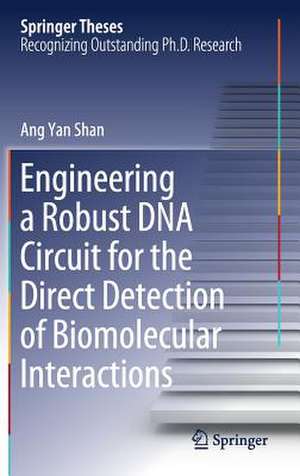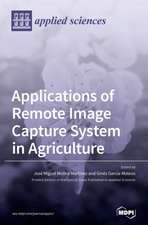Engineering a Robust DNA Circuit for the Direct Detection of Biomolecular Interactions: Springer Theses
Autor Ang Yan Shanen Limba Engleză Hardback – 10 oct 2018
| Toate formatele și edițiile | Preț | Express |
|---|---|---|
| Paperback (1) | 637.46 lei 43-57 zile | |
| Springer Nature Singapore – 19 ian 2019 | 637.46 lei 43-57 zile | |
| Hardback (1) | 643.65 lei 43-57 zile | |
| Springer Nature Singapore – 10 oct 2018 | 643.65 lei 43-57 zile |
Din seria Springer Theses
- 18%
 Preț: 997.88 lei
Preț: 997.88 lei -
 Preț: 389.88 lei
Preț: 389.88 lei - 15%
 Preț: 646.94 lei
Preț: 646.94 lei - 18%
 Preț: 943.43 lei
Preț: 943.43 lei -
 Preț: 399.29 lei
Preț: 399.29 lei - 18%
 Preț: 944.99 lei
Preț: 944.99 lei - 15%
 Preț: 636.80 lei
Preț: 636.80 lei - 18%
 Preț: 941.05 lei
Preț: 941.05 lei - 15%
 Preț: 643.16 lei
Preț: 643.16 lei - 15%
 Preț: 642.68 lei
Preț: 642.68 lei - 18%
 Preț: 1103.62 lei
Preț: 1103.62 lei - 20%
 Preț: 558.82 lei
Preț: 558.82 lei - 18%
 Preț: 1112.30 lei
Preț: 1112.30 lei - 18%
 Preț: 944.19 lei
Preț: 944.19 lei - 18%
 Preț: 1109.92 lei
Preț: 1109.92 lei - 18%
 Preț: 1217.27 lei
Preț: 1217.27 lei - 15%
 Preț: 640.06 lei
Preț: 640.06 lei - 15%
 Preț: 636.45 lei
Preț: 636.45 lei - 15%
 Preț: 640.06 lei
Preț: 640.06 lei - 15%
 Preț: 640.88 lei
Preț: 640.88 lei -
 Preț: 389.70 lei
Preț: 389.70 lei - 20%
 Preț: 563.89 lei
Preț: 563.89 lei -
 Preț: 393.35 lei
Preț: 393.35 lei - 15%
 Preț: 637.93 lei
Preț: 637.93 lei - 15%
 Preț: 641.85 lei
Preț: 641.85 lei - 18%
 Preț: 1225.94 lei
Preț: 1225.94 lei - 20%
 Preț: 551.36 lei
Preț: 551.36 lei - 18%
 Preț: 1229.10 lei
Preț: 1229.10 lei - 15%
 Preț: 639.25 lei
Preț: 639.25 lei - 18%
 Preț: 999.45 lei
Preț: 999.45 lei - 15%
 Preț: 640.06 lei
Preț: 640.06 lei - 18%
 Preț: 1220.45 lei
Preț: 1220.45 lei - 18%
 Preț: 1116.26 lei
Preț: 1116.26 lei - 18%
 Preț: 1110.72 lei
Preț: 1110.72 lei - 18%
 Preț: 1000.87 lei
Preț: 1000.87 lei - 18%
 Preț: 891.17 lei
Preț: 891.17 lei - 15%
 Preț: 640.06 lei
Preț: 640.06 lei - 5%
 Preț: 1154.07 lei
Preț: 1154.07 lei - 15%
 Preț: 635.96 lei
Preț: 635.96 lei - 15%
 Preț: 640.88 lei
Preț: 640.88 lei -
 Preț: 387.20 lei
Preț: 387.20 lei - 18%
 Preț: 1109.92 lei
Preț: 1109.92 lei -
 Preț: 385.25 lei
Preț: 385.25 lei -
 Preț: 385.25 lei
Preț: 385.25 lei - 18%
 Preț: 1112.30 lei
Preț: 1112.30 lei - 18%
 Preț: 999.45 lei
Preț: 999.45 lei -
 Preț: 386.99 lei
Preț: 386.99 lei - 15%
 Preț: 637.13 lei
Preț: 637.13 lei - 20%
 Preț: 554.20 lei
Preț: 554.20 lei - 20%
 Preț: 555.57 lei
Preț: 555.57 lei
Preț: 643.65 lei
Preț vechi: 757.24 lei
-15% Nou
Puncte Express: 965
Preț estimativ în valută:
123.17€ • 127.82$ • 102.95£
123.17€ • 127.82$ • 102.95£
Carte tipărită la comandă
Livrare economică 17-31 martie
Preluare comenzi: 021 569.72.76
Specificații
ISBN-13: 9789811321870
ISBN-10: 9811321876
Pagini: 240
Ilustrații: XLV, 188 p. 117 illus., 30 illus. in color.
Dimensiuni: 155 x 235 mm
Greutate: 0.51 kg
Ediția:1st ed. 2018
Editura: Springer Nature Singapore
Colecția Springer
Seria Springer Theses
Locul publicării:Singapore, Singapore
ISBN-10: 9811321876
Pagini: 240
Ilustrații: XLV, 188 p. 117 illus., 30 illus. in color.
Dimensiuni: 155 x 235 mm
Greutate: 0.51 kg
Ediția:1st ed. 2018
Editura: Springer Nature Singapore
Colecția Springer
Seria Springer Theses
Locul publicării:Singapore, Singapore
Cuprins
Introduction.- Literature Review.- Materials and Methods.- Modular Framework for Engineering a Self-Contained DNA Circuit.- Designing Hybridization Chain Reaction Monomers for Robust Signal Amplification.- Design Concepts in Association Toehold for Robust Signal Transduction.- DNA Split Proximity Circuit as a General Platform for Interrogating Biomolecular Events.- DNA Split Proximity Circuit for Visualizing Cell Surface Receptor Clustering- A Case Study Using Human Epidermal Growth Factor Receptor Family.- Conclusion and Future Outlooks.
Textul de pe ultima copertă
This book provides essential insights into designing a localized DNA circuit to promote the rate of desired hybridization reactions over undesired leak reactions in the bulk solution. The area of dynamic DNA nanotechnology, or DNA circuits, holds great promise as a highly programmable toolbox that can be used in various applications, including molecular computing and biomolecular detection. However, a key bottleneck is the recurring issue of circuit leakage. The assembly of the localized circuit is dynamically driven by the recognition of biomolecules – a different approach from most methods, which are based on a static DNA origami assembly. The design guidelines for individual reaction modules presented here, which focus on minimizing circuit leakage, are established through NUPACK simulation and tested experimentally – which will be useful for researchers interested in adapting the concepts for other contexts. In the closing section, the design concepts are successfully applied to the biomolecular sensing of a broad range of targets including the single nucleotide mutations, proteins, and cell surface receptors.
Caracteristici
Offers readers essential insights into designing a localized DNA circuit to promote the rate of desired reaction over undesired leak reactions in the bulk solution Proposes design concepts for individual reaction modules, with a focus on minimizing circuit leakage Covers applications for the biomolecular sensing of a broad range of targets including the mutation of nucleic acids, protein, and cell surface receptors






















